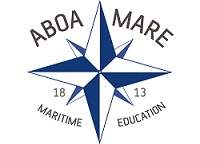Liquefied natural gas (LNG) is a new, more environmentally friendly fuel for the maritime industry, as LNG does not emit soot or other particles during combustion, and it is cost-efficient in marine transport over long distances. Aboa Mare has met the maritime industry’s training needs and offers Basic and Advanced training for mariners working on board vessels subject to the Code of Safety for Ships using Gases or other Low-flashpoint Fuels (IGF Code).
Aboa Mare is the first Maritime Academy in Finland, offering Basic (A-V/3, paragraph 1) and Advanced (A-V/3, paragraph 2) training for personnel on ships subject to the IGF Code. The Finnish Maritime Authorities approve that the required 30 sea days on board an IGF ship, including three LNG bunkering operations for the Advanced certificate STCW Regulation V/3 [8.2], can be substituted with a separate IGF simulator course. The IGF courses are a result of the cooperation between Aboa Mare, Meriturva, Wärtsilä Land and Sea Academy, ESL Shipping and the Finnish Maritime Authorities.
The IGF Code requirements are mandatory since January 2017
The International Code of Safety for Ships using Gases or other Low-flashpoint Fuels (IGF Code) entered into force on January 1st, 2017. The IGF Code addresses ship design, construction and equipment, as well as operational and training concerns (imo.org).
Aboa Mare offers comprehensive Basic and Advanced level training including practical firefighting exercises subject to the IGF Code. Aboa Mare’s Basic and Advanced IGF Code courses also comply with the requirements laid down in the International Convention on Standard of Training, Certification and Watchkeeping for Seafarers (STCW).
The Basic level course intends to provide Basic training for seafarers responsible for designated safety duties associated with LNG fuel care, use or emergency response on board ships subject to the IGF Code. The Advanced level course intends to provide Advanced training for masters, officers and all personnel with immediate responsibility for the care and use of fuels and fuel systems on ships subject to the IGF Code.
“This course is an excellent example of seamless cooperation needed between different stakeholders when introducing new environmentally friendly technology and solutions. We have been very satisfied with the course syllabus, organizer, facilities and flexible service received from our partners on this project,” says Mikko Rausti, Sea Personnel Manager at ESL Shipping.
LNG is becoming more popular as ship fuel for many reasons:
- Cost-efficient in marine transport over long distances
- Reduction of environmental impacts in comparison to conventional engines
- Up to 20% lower GHG (Greenhouse Gas) emissions
- Up to 30% lower CO2 (Carbon Dioxide) emissions
- Up to 85% lower NOx (Nitrogen) emissions
- Very low or no SOx (Sulphur) emissions
- Very low PM (Particle) emissions. Particles pose a problem when using e.g. heavy fuel oil
- No visible smoke
- No sludge deposits
Deck and engine officers from ESL Shipping completed IGF courses at Aboa Mare in October 2017
Captains, engine officers and crew involved in bunkering operations on IGF ships at the Finnish bulk shipping company, ESL Shipping, participated in a combined Basic and Advanced IGF course as well as in an IGF simulator course at Aboa Mare and Wärtsilä Land and Sea Academy in Turku, Finland, in October 2017. Aboa Mare’s Basic and Advanced courses comply with the requirements of the International Code of Safety for Ships using Gases or other Low-flashpoint Fuels (IGF Code) and with the requirements laid down in the International Convention on Standard of Training, Certification and Watchkeeping for Seafarers (STCW).

